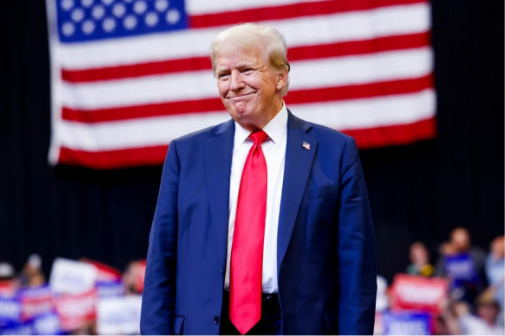
A Democratic-aligned political action committee filed a complaint with federal election regulators accusing Donald Trump, his campaign and the social media site X of violating federal election laws during Trump’s interview with tech billionaire Elon Musk.
Trump’s lengthy interview with Musk on Monday “violated” federal rules banning corporations from making contributions to federal candidates, and barring federal candidates from accepting such contributions,” alleged the complaint filed Tuesday by the group End Citizens United.
The group said the interview “amounted to a virtual campaign event for Donald J. Trump financed by X.”
“Such a brazen corporate contribution undermines the anti-corruption aims of the Act, and the [Federal Election] Commission should immediately investigate these violations and take appropriate remedial action,” the complaint said.
Campaign Treasurer Bradley T. Crate was also named in the complaint.
The filing jabbed Musk and his app, noting in the “facts” section that the interview “generated headlines” but was “marred with technical issues that featured express advocacy by X owner Elon Musk to support the Trump Campaign.”
In the legal analysis section, the complaint alleges that a “contribution” — which corporations are banned from making to candidates — includes “‘anything of value’ provided to a federal candidate in connection with their election.”
“The Commission has held that activities involving the participation of a federal candidate result in contributions ‘if the activities involve i) the solicitation, making, or acceptance of contributions to the candidate’s campaign, or ii) communications expressly advocating the nomination, election, or defeat of any candidate.”
Tiffany Muller, president of the group, which is supporting Kamala Harris in the race, told The Washington Post in a statement that the interview could “set a dangerous precedent for unfettered, direct corporate engagement in campaigns.”
One problem for End Citizens United: such complaints to the FEC often take months, if not years, to investigate and debate, and it’s highly unlikely the bipartisan commission of three Republicans and three Democrats will reach a resolution before the presidential election on Nov. 5.
The FEC’s six commissioners, who are frequently divided along ideological lines, often deadlock on high-profile and matters, too, with tie votes of 3-3 leading to the dismissal of a case.
If anything, the current mix of FEC commissioners has tilted toward loosening campaign finance rules, with Dara Lindenbaum, a Democratic appointee of President Joe Biden, joining the commission’s three Republican appointees on key votes — much to the chagrin of campaign finance reformers.



